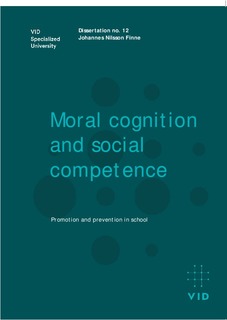Moral cognition and social competence: promotion and prevention in school
Doctoral thesis
Published version
Permanent lenke
http://hdl.handle.net/11250/2568201Utgivelsesdato
2018Metadata
Vis full innførselSammendrag
Social competence is important to well-being and social and personal development. The lack of social competence is linked to bullying in school, young people’s failure to qualify for work, and other types of externalizing and internalizing difficulties. A growing body of evidence has identified factors in the complex interplay between individuals and their environment that influence behavior, relationships, and development in young people. For instance, the role of social perception and moral cognition in behavior problems has received considerable focus in recent years. Although school is important for socialization and offers many possibilities for social and emotional learning and growth, few universal intervention programs focus explicitly on interpretive abilities and moral cognition
Paper I: Finne, J.N. & Svartdal, F. (2017). Social perception training (SPT): improving social competence by reducing cognitive distortions. The International Journal of Emotional Education, 2017, 9 (2), 44-58.
Paper II: Finne, J.N. & Svartdal, F. (in preparation). The How I Think (HIT) Questionnaire: Measuring cognitive distortions in children and adolescents. /Not in the file in Brage because of copyright restrictions
Paper III: Finne, J.N., Roland, E., & Svartdal, F. (submitted). Relational rehabilitation: reducing harmful effects caused by bullying. /Not in the file in Brage because of copyright restrictions.
Beskrivelse
Avhandling (ph.d) - VID vitenskapelige høgskole, Oslo, 2018
